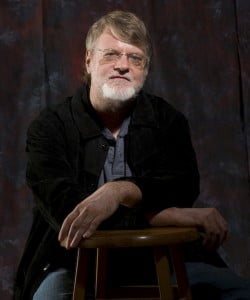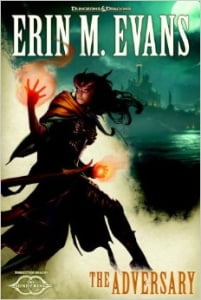Posts Tagged ‘The Sundering’
Exclusive Q&A Interview with Erin Evans by Alfred Cloutier
Tuesday, December 3rd, 2013
Erin M. Evans Q&A
by Alfred O. Cloutier
Erin M. Evans is the author of the new book, The Adversary, which is Book II of The Sundering Series, which follows the adventure of Farideh, a Tiefling Warlock from the Forgotten Realms. Erin is also the author of the Brimstone Angels series of novels. You can find her here on Facebook, and here on Twitter (@erinmevans).
Alfred Clouter: How is the Brimstone Angels series carrying into The Sundering?
Erin M Evans: The Adversary follows directly off of Brimstone Angels: Lesser Evils, taking Farideh, her friends, and her enemies right into the middle of the gods’ battles for power, played out among their most ruthless followers.AC: How are your characters affected by the overall events in The Sundering? What is their role in the event?
EME: Farideh makes a decision very early in the book which results in her being “loaned” to the Shadovar (people from the City of Shade) running an internment camp. Part of the story is Farideh (and the Harpers) figuring out what the camp is for and what the Shadovar are up to and how to stop them. At the same time, the gods have their own plans, and that goes double for the last god to enter the pantheon—Asmodeus, the king of the Hells.AC: Paul S. Kemp also had his Godborn story folded into The Sundering, which resulted in three potential books turning into one book. Did anything similar happen to you?
EME: In a way. Originally, I was asked to come up with a story that revolved around a human or half-elf character, the feeling being that those races are the ones people could identify with. But I really didn’t want to—I was in the middle of the Brimstone Angels series, and some of the story arcs I’d planned clicked into the Sundering in ways that made them so much better. So I made a very persuasive argument that tieflings were no less relatable than humans (or a certain drow fellow!)—in fact, how relatable a character was would always depend on how they were written—and won them over.AC: How do you pronounce “Farideh?”
EME: It rhymes with “fajita.” (Assuming you pronounce fajita like “Farideh.”)
AC: On your blog you write about a “Choose Your Own Adventure” style of flowcharting for writing. In this case it was for Lorcan, a Cambion character from The Adversary. Can you comment further on this technique? Are they formal flowcharts?
EME: Unfortunately getting into too much detail would spoil the story! Like most tricks I come up with to get around writer’s block, it was pretty informal. In this case, one character, Lorcan (Farideh’s cambion pact-holder) wasn’t really acting like himself in the first draft and I couldn’t figure out where he’d gone off the rails. So I made a sort of flowchart dividing up Lorcan’s potential reactions to various events: Does he know what happened? Is he aware of why Farideh did what she did? Does he buy Sairche’s explanation? etc. Through that I found ten different storylines for Lorcan that could have happened in The Adversary, which let me choose the best one.AC: Something you mention in your video interview about the book makes me think that Forgotten Realms might be the most detailed fictional world ever created. What do you think of that?EME: If it isn’t, it’s definitely in the running. The world is enormous and so many talented authors and designers have contributed to it, so many people have experienced the Forgotten Realms—through their own games, through the novels, through adventures, through other related media. When you step back and consider it, it’s quite extraordinary.
AC: What attracts you to Forgotten Realms? What about the world inspires you?
EME: I really appreciate how deep and how open the Forgotten Realms manages to be—you can have almost any sort of story set in the realms. Gritty, grim tales of men with scars and swords. Light-hearted stories about adventuring companions. Alien stories about strange races. Mysteries. Thrillers. Heck, at every single story summit we’ve had, Ed Greenwood brings up the idea of doing a sub-line of Realms romance novels—and you could do that really well. But a true Realms book always feels magical and relatable, exciting and maybe a little whimsical. They’re all different and yet they’re all a little familiar. Writing in that setting is great because I’ve never really felt like I had to change the way I wrote—the world has room for my stories. Plus, it’s pretty fantastic to have so much lore to draw on. There’s tens of thousands of years of history, wherever your characters walk—and someone out there is going to appreciate the fact that they recognize it. For The Adversary, I pored over Volo’s Guide to the Dalelands and The Dalelands, just to be able to write this: “My brother-in-law had family outside Harrowdale. Tassadrans originally, but they have lived there since the Sembians invaded. Did you know a fellow called Melias by some happenstance?” If you are not into the lore, all that’s there is two people from the same general area trying to figure out if they know the same people. If you’re into it, you see events from more than a hundred years ago having ripple effects into the current era. I love that.
AC: Have you ever played a D&D session with the characters in your novels?
EME: I recently got to play in a game for Extra Life, a gamer charity that benefits Children’s Miracle Network. As a bonus to donors, I ended up playing as Havilar, which was great fun. She killed a displacer beast while half-asleep, tried to kick down a sliding stone door, and shared some very strong whiskey with her party (and, of course, the ghosts).
AC: I love the fact that Farideh is a “female warlock,” which is a contradiction by dictionary definitions, but perfectly proper by D&D standards.
EME: It’s funny, I’ve never blinked at that. It’s not “correct” but I’m so used to a “witch” being a completely different thing!
AC: What is your externally observable process for writing? What time of day do you write, and for how long?
EME: I spend about half the day writing, four days a week, in a coffee shop because often my son is home with his aunt, who watches him. He’s two, and fond of slamming my laptop shut and declaring “Momma all done worky.” I’m definitely not the most diligent writer—I’m really easy to distract—so I use a lot of tricks to keep me typing. My latest favorite is a program called Write or Die. You set goals for yourself (word count and time), and then choose a punishment. If you stop typing for more than a few seconds, you get punished. I always pick “Kamikaze”—if I stop, it starts deleting what I wrote.I also revise a lot. Some scenes take me three or four tries to get just right.
About The Adversary, the Sundering, Book III by Erin M. Evans
In the 3rd book of the multi-author Sundering series, the award-winning Erin M. Evans throws her signature character Farideh into a maelstrom of devilish politics and magical intrigue. Captured by Netherese agents and locked away in a prison camp, Farideh quickly discovers her fellow prisoners are not simply enemies of Netheril, but people known as Chosen who possess hidden powers, powers that Netheril is eager to exploit—or destroy.
As Farideh’s friends and sister race across the landscape on a desperate rescue mission, Farideh is drawn deeper into the mystery of the Netherese plot alongside two undercover Harper agents. But will her closest ally turn out to be an adversary from her past?
About The Sundering
The most popular setting in the Dungeons & Dragons universe, The Forgotten Realms, will be reshaped by an epic event, the Sundering. The Sundering is an extensive story spanning multiple expressions of the contemporary fantasy entertainment franchise that offers fans the opportunity to impact the fate of the world along the way. Key milestones in the year-long Sundering storyline will take place in iconic locations like Baldur’s Gate, Neverwinter and Icewind Dale, to name a few. The changes to the Forgotten Realms can be experienced through a series of novels, in-store play experiences, digital offerings, comics, accessories and tabletop RPG adventures. Through these expressions, Dungeons & Dragons (D&D) fans will be able to engage and impact the fate of the Forgotten Realms forever.
The Six Sundering Novels include: R.A. Salvatore (The Companions), Paul S. Kemp (The Godborn), Erin M. Evans (The Adversary), Troy Denning (The Sentinel), Richard Lee Byers (The Reaver), and Ed Greenwood (The Herald)
About the Author:
Alfred O. Cloutier has contributed to Dragon Magazine, and has edited for a number of other gaming publishers. He can be found on Facebook.
Tags: Alfred Cloutier, Brimstone Angels, Erin Evans, Forgotten Realms, The Adversary, The Sundering, Wizards of the Coast
Posted in Blog, Featured Post, Popular Posts | 3 Comments »

_Cover.jpg)









Social: